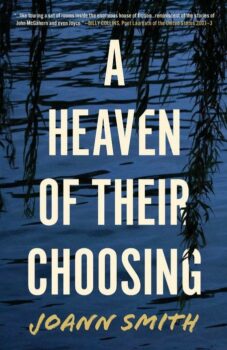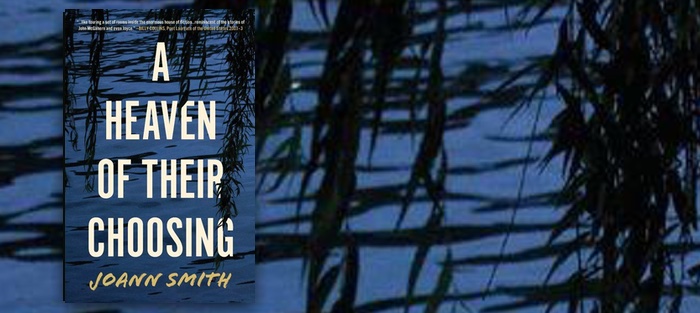Joann Smith’s debut collection, A Heaven of Their Choosing (7.13 Books), examines the female existence with the acuity of Margaret Atwood or Alice Munro, exploring the complexities of womanhood with exquisite subtlety. In one story, a mother navigates her adopted daughter’s harrowing night-terrors while simultaneously grappling with the memory of her long-dead first love. In another, the Virgin Mary materializes in a Bronx apartment, prompting a woman to reinvestigate her faith in the everyday. A stone on a grave in a military cemetery sends the reader spiraling back through time in a tale of grief, missed opportunities, and acceptance. A child born with startlingly red hair helps a young mother make peace with both her past and her future. The world of these stories is often a lonesome one, where in the absence of connection, characters’ lives are enriched by memory and imagination. Smith, however, is never bleak. With infinite finesse, she spins these tales into messages of hope, gently reminding us to hold fast to faith.
Smith is also a master of chronology. Her narratives seamlessly intertwine the past and present, giving the stories a sense of universality and permanence. Whether a character occupies our consciousness for a few short pages, like the unnamed narrator of “The Purge,” or for a longer journey, like Kate’s from fantasy to clarity in “Wall Man,” one gets the sense that these characters’ lives extend well beyond the pages of this slim volume. Though we may know them for only a short while, Smith’s impeccable control over time renders them real as someone you speak to in passing on a train.
The first story in the collection, “Prayer at the Sandbar,” provides an early glimpse of Smith’s chronological wizardry. It transpires over the course of an afternoon, but also a lifetime. The narrator revisits a favorite beach, where a trio of topless sunbathers serve as a catalyst for a masterfully crafted unspooling of time, touching upon everything from mothering to recovery to the personal and political implications of baring reconstructed breasts. Smith’s depiction of the beach is at once wry and profound:
It’s a family beach but without the dozens of kids—more paunches than sandcastle builders. No lifeguards, no bathrooms, no concessions, no garbage cans. It’s a place where, when the tide is out, you can walk at least half a mile and still not be in water over your waist. I learned that when my daughter and her friend, both eight years old, drifted out on their blow-up boat.
Danger in this story is deceptive: lying on the sandbar adrift in quiet melancholy, the narrator appears up against something far more terrible than her young daughter, seemingly adrift miles out to sea. With a kindness of spirit characteristic of the collection, the author transforms this into a moment of hope, and we leave the narrator grateful for what she has at this one particular moment in time.
“Something Grand” succeeds in introducing subtle hope to a situation far more dire. When Mary’s husband of many decades dies suddenly, she is torn between grief and resentment. Mike is the favored parent and the neighborhood charmer while Mary leads her life like a to-do list, eschewing family outings to bleach grout, organize cupboards, and perform all those wifely duties that just can’t seem to wait a second. She deeply resents Mike, who carries the dried-out caul he was born in in a black velvet pouch in his wallet, and puts endless faith in the idea of luck. As she struggles to arrange Mike’s funeral, Mary replays old resentments, wondering “if all widows did this–went over their marriages as though they were stories they could rewrite.” In choosing to hold Mike’s funeral in a local school gym after their church burns down, Mary fails to rewrite. After an excruciating service (“the smells of perspiration, floor wax, and rubber intermingling with the incense”), she stumbles upon an avenue to redemption: the placing of the caul in a box that will lie beneath the altar of the new church. This may be a private act and a quiet one, but in the end, what could have been doesn’t matter. Mary has done something grand.
 “Phlebotomist’s Day” begins under similarly bleak circumstances. Beset by worry over an irregular mammogram, Kate visits a “mall-like medical center” for a series of appointments. As she endures them, she conjures up an image of Mr. Teller, her elementary choirmaster: “Dyed (the choir members suspected) black hair, belly over his belt, his arm in the air directing them to send their voices up to heaven.” The children quietly mock Mr. Teller while their parents close their eyes and float away on his voice, something Kate experiences for herself years later when her boyfriend takes her to Rinaldo and the countertenor’s voice becomes “what she had always imagined a soul to be, a soft mist rising toward the ceiling of the opera house, passing through the roof to the night sky, flying to heaven, sure of the way.” Rinaldo serves as a compelling framing device, the lump and the opera both things Kate doesn’t want to engage with at first. As “Phlebotomist’s Day” unfolds, the parallel stories build upon each other, adding complexity and depth to the narrative. In the end, Kate faces both her past and her present, accepting that Mr. Teller has given her the ability to “send her voice and soul out, pleading toward heaven.”
“Phlebotomist’s Day” begins under similarly bleak circumstances. Beset by worry over an irregular mammogram, Kate visits a “mall-like medical center” for a series of appointments. As she endures them, she conjures up an image of Mr. Teller, her elementary choirmaster: “Dyed (the choir members suspected) black hair, belly over his belt, his arm in the air directing them to send their voices up to heaven.” The children quietly mock Mr. Teller while their parents close their eyes and float away on his voice, something Kate experiences for herself years later when her boyfriend takes her to Rinaldo and the countertenor’s voice becomes “what she had always imagined a soul to be, a soft mist rising toward the ceiling of the opera house, passing through the roof to the night sky, flying to heaven, sure of the way.” Rinaldo serves as a compelling framing device, the lump and the opera both things Kate doesn’t want to engage with at first. As “Phlebotomist’s Day” unfolds, the parallel stories build upon each other, adding complexity and depth to the narrative. In the end, Kate faces both her past and her present, accepting that Mr. Teller has given her the ability to “send her voice and soul out, pleading toward heaven.”
In “A Heaven of Their Choosing,” a dying woman commissions a custom coffin from an estranged friend, causing them to reflect back on the summer of their schism. Smith seamless interposes past and present, crafting a tale of grief, friendship and, ultimately, forgiveness. The beautifully painted coffins meant, not to convey their occupants to heaven, but to be heavens in themselves are a fascinating narrative device, though redemption in this story occurs during conversation, not reflection, which makes it feel perhaps a little less earned. The author concludes on a bittersweet note with the striking image of a coffin painted with “a beautiful heaven full of trees and sweet memories that Pat would lie down in when the time came.”
A Heaven of Their Choosing is a collection that will stay with you long after you have turned the last page. You will find yourself returning to these characters time and again, reconsidering the little choices that make your own life what it is.






